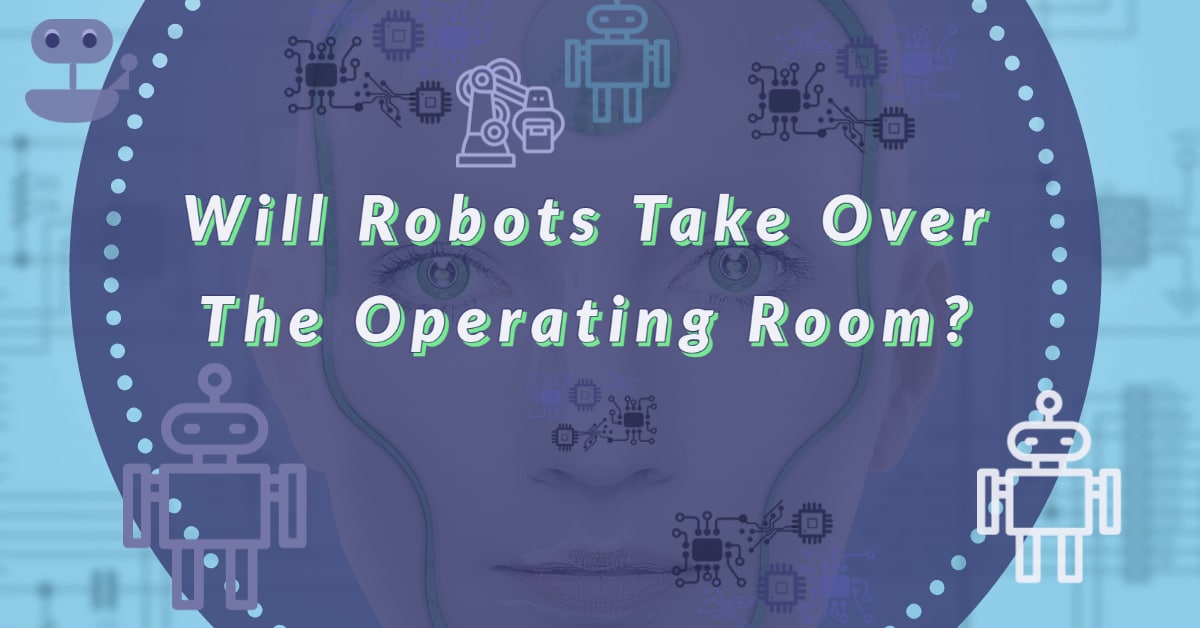Will Robots Take Over The Operating Room?
In the pursuit to enjoy longer and healthier lives, we look to the practically unlimited potential of technology. The steady increase in life expectancy and gradual quality-of-life improvements can be attributed (at least in part) to technological advances spearheaded by the healthcare industry.
The Role of Robotics in the Operating Room
Robot-assisted healthcare operations were once considered an invention of sci-fi films, but the reality is that they’ve been around for a while. Machines continue to revolutionize healthcare through the use of robotics, artificial intelligence (AI), 3D printing, augmented reality (AR), and virtual reality (VR).
Robotic-assisted surgeries have been used worldwide for decades. This technological leap plays a pivotal role in the operating room. Surgical robots, like the da Vinci Surgical System, improve precision and accuracy which is especially helpful during complex procedures. They provide control over small robotic tools that can be inserted into the body and provide a much wider range of motion than a human hand. In addition, they are used in tandem with VR technology – doctors use virtual reality to view the surgical site from inside the patient with minimal invasiveness. These improvements benefit the patient greatly by reducing the risks associated with surgery and overall recovery time. Robotic-assisted surgeries also result in shorter recovery times, less postoperative pain, and fewer complications due to blood loss and infection.
In the Covid-19 era, physical contact between the surgeon, operating staff, and patients has been drastically reduced to minimize the risk of virus transmission. These conditions have made telemedicine a popular alternative to in-person appointments. This environment has fostered the rapid development of medically-oriented artificial intelligence (AIs) and the widespread deployment of blockchain networks into the healthcare ecosystem. AIs can provide insight and suggestions for doctors who are overwhelmed with patients – some AIs can even diagnose some types of cancer as well as a doctor. They have proven to be valuable and smart assistants for our overworked MDs. Meanwhile, blockchain technology can secure patient records, eliminate bureaucracy, and improve the overall quality of care.
The Place of Surgeons and Support Staff in the Future
Advancements in surgical technology have provided a number of benefits. Robotics lower the load on surgeons and their operating team while improving their operating abilities, promoting successful post-surgery outcomes. However, no matter how sophisticated and modern technologies may become, robots are unlikely to replace surgeons and their teams in the near future. The surgical support staff is still needed to do pre and post-operation disinfecting, sterilizing, troubleshooting, and accounting equipment. The human component of healthcare is still alive and thriving.
Human surgeons and support staff also bring vital components to the OR that robots cannot. Empathy, compassion, and intuition are vital in the delivery of healthcare services. The presence of emotion and human abilities are important to surgery as a whole. On a psychological level, a patient should be able to form a bond of trust and respect with their surgeon.
Although robots can outcompete humans on repetitive and simple tasks, they still come with their own set of limitations and flaws. Robots still depend on the creative and analytical skills of surgeons and surgical support staff to make sound judgments. Surgical robots are not able to make decisions for themselves and are completely reliant on the people that operate them. Robots in the OR are simply another tool that surgeons can use to enhance their abilities and improve patient recovery.
Robots won’t be performing surgeries by themselves anytime soon. But if they could, would any patient even agree to go under a knife held by non-human hands? If something goes wrong during the operation, can the robot take responsibility and be held accountable for any mistakes? Only time will tell.
If you’d like to learn more about careers in healthcare and course offerings, contact Altamont Healthcare in Stockton and Bakersfield, CA.
We offer certification programs in CPR and Basic Life Support, Electrocardiogram Technology (EKG), Endoscopy Reprocessing Technician (ERT), Sterile Processing and Distribution (SPD), and Surgical Technology.
Call us at (209) 817-8035 (Stockton) or (661) 230-6316 (Bakersfield) to ask about our programs. Tuition discounts are available for certain payment options. Customized payment schedules are available upon request.


